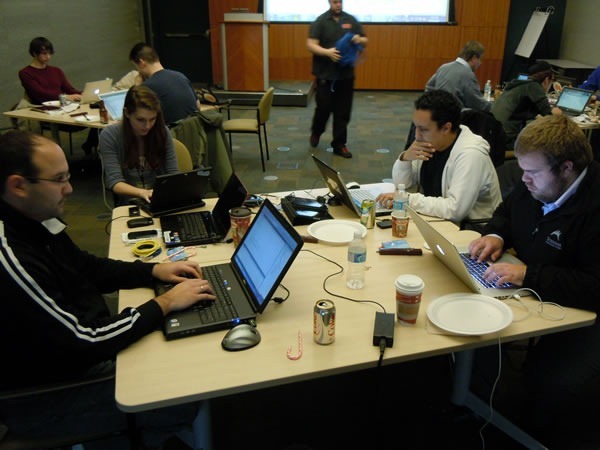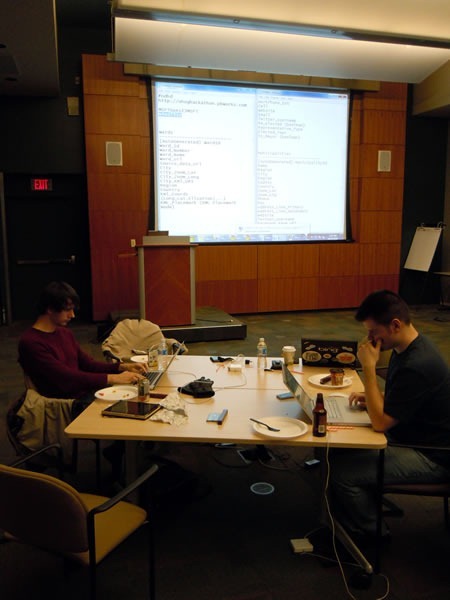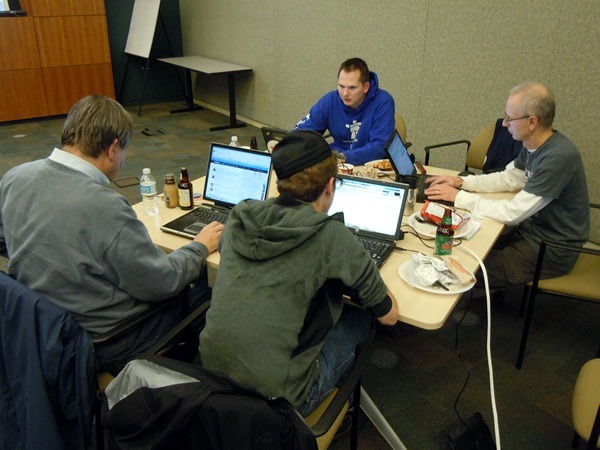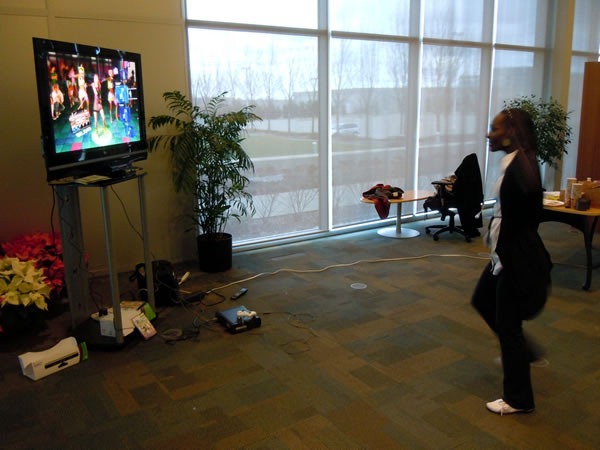A couple of weekends ago, I had the good fortune to being able to stop in and help out at not one but two “hackathons” – programming marathons – where the people taking part were writing software for the common good and which made use of open data. They took place on the same day and were still well-attended, a good sign that the geeks here in Toronto aren’t like the self-absorbed self-interested ones chronicled in Paulina Borsook’s Cyberselfish. These people gave their time and talent for a good cause and asked for nothing but to be fed – I salute them with a filet mignon on a flaming sword!
Open Data Hackathon

On Saturday, December 4th, Microsoft’s open source initiative guy, Nik Garkusha, organized a hackathon at Microsoft Canada headquarters in Mississauga where developers would work on a project that would be based on Halton Region open data and would serve the public interest.

The event coincided with International Open Data Hackathon Day, an event shared among 63 cities in 25 countries whose goals were:
- To help raise the awareness of open data and why it matters
- To help foster communities of techies, active citizens and others who care about open data
- To have fun using the technology we love to create open data solutions that contribute to the public good

And of course, being a Microsoft event, we also set up an Xbox with Kinect so that participants could take a break, get away from the computer and move about“

Random Hacks of Kindness

Random Hacks of Kindness (RHoK, pronounced “rock”) also took place on Saturday, December 4th and stretched to the following day. Think of it as the intersection of developers and other assorted geeks meeting up with tech-savvy do-gooders to develop software to help people and make the world a better place. It’s a joint initiative among Microsoft, Google, Yahoo!, NASA and the World Bank, and the actual legwork is done by volunteers who gather to hold hackathons in cities all over the world.
Here’s the story of how RHoK got started, according to Wikipedia:
Random Hacks of Kindness grew out of an industry panel discussion at the first Crisis Camp Bar Camp in Washington DC in June 2009. Panel attendees included Patrick Svenburg of Microsoft, Phil Dixon of Google and Jeremy Johnstone of Yahoo!. They agreed to use their developer communities to create solutions that will have an impact on disaster response, risk reduction and recovery. The idea was for a "hackathon" with developers producing open source solutions. The World Bank’s Disaster Risk Reduction Unit and NASA’s Open Government team joined the partnership and these "founding partners" (Microsoft, Yahoo, Google, NASA and the World Bank) decided on the name "Random Hacks of Kindness" for their first event.
I attended as both a sponsor’s representative and judge for submissions at the Toronto RHoK, which was organized with the help of my former co-worker at Tucows, Heather Leson, who’s one of our local Crisis Commons representatives. Joining me on the panel of judges were:
- Stephanie Ashton-Smith from Plan Canada
- Ben Lucier from Tucows
- Will Pate from the World Bank
- Adam Thody from Architech Solutions

This was the first RHoK to take place in Canada and had 52 participants collaboration on eight projects. Our group gathered in rooms on the 4th floor of University of Toronto’s Ontario Institute for Studies in Education (OISE). Worldwide, about 1,000 participants in 20 cities joined in the RHoK project and worked on some kind of software for a good cause, and many of these events were linked together via streaming video.

The RHoK participants had the weekend to come up with a software solution to a “good cause” problem, implement it and present it at the end of the final day. Many of the participants haven’t had much practice presenting, so while some people kept working on their applications, Will Pate gave a quick tutorial on making technical presentations, which I captured in the photo below:

At the end of the second day, we all gathered in the main room to watch the teams present their applications. The session opened with Heather Leson providing the introductions:

…and the Melanie Gorka adding some details…

…and with Melanie done, it was time to start the presentations!

Person Finder

This was the first presentation. At an RHoK event last year, a team had put together a web application that made it simple for people to submit requests for information about missing friends and relatives in a disaster. This team decided to extend its capability by creating a RESTful API for the application, enabling people to develop specialized client applications that would access the original as a service.
Payout to Mobile

In developing countries, farmers often buy cheaper, lower quality seed out a fear of being having their crops wiped out by drought or flood and not having any cash reserves to survive afterwards. If they had access to some kind of insurance for their crops, they could afford to buy better seed and potentially triple their yields.
Payout to Mobile is the technical portion of a solution that allows these farmers to get their crops insured. When a farmer goes to buy seed or fertilizer, the vendor uses SMS to get a set of insurance quotes – “kind of like Progessive” – for policies that get sold along with the farmer’s purchase. If a weather event specified in the policy occurs, the farmer gets a payout.
Population Centres

This was a project that took online population data and turned it into visualizations that would allow disaster planners to better determine appropriate assistance based on population and population densities.
We Are Helping

In a disaster, it’s easy for aid groups to coordinate outside agencies. However, local people who also have the skills to lend a hand (and oftentimes, a better “feel” for the local area and culture) can be left out. This is a classic “access to information” problem, and this application lets local responders self-organize. The people behind this project discussed the possibility of tying this in with other projects being developed at RHoK hackathons, including Tweak the Tweet and I’m Not OK.
Is This Bike Stolen?

Here’s something that would appeal to anyone who’s been a victim of Igor Kenk, Toronto’s notorious bike superthief. This is a web application that lets you check the serial number of a bike you’re about to buy against the Toronto Police’s database of serial numbers of stolen items.
Where Not to Rent

This web application might come in handy if you’re looking for a place to rent in Toronto. It makes use of a Toronto Open Data store that track reports of rental property deficiencies, including the hot topic of the moment: bedbugs! By the time you read this, the app should be live at http://wherenottorent.refactory.ca/.
Tweak the Tweet

This application combs through Twitter in search of actionable data for emergency reponse teams, making use of location tags.
City Budgets

The Toronto city budget data is buried within a monolithic 600-page PDF report and some Toronto Open Data files. This application, inspired by what the British paper The Guardian has been doing with open data, takes all that information and turns them into more comprehensible interactive charts and graphs.

We judges retired to our secret chambers and after some deliberation, declared these projects the winners:
- Third place: Payout to Mobile
- Second place: Tweak the Tweet
- First place: Is This Bike Stolen?
We also declared participant Jon Pipitone as the “MVP” of the event for being a leader, participating in more than one project and mentoring people.
If you wanted to find out more about the Toronto RHoK event, check out these other articles:
- Heather Leson’s RHoK Toronto and Global Wrap-Up
- Global News’ report, Hacking for Humanity
- Mark Kuznicki’s Hacking for Good
- Melanie Gorka’s RHoKing Out in Toronto
3 replies on “Hacking for Good Causes”
[…] This article also appears in Global Nerdy. […]
[…] I attended RHoK 2 in December as an interested party as well as a Microsoft representative, and I wrote up the event in an article titled Hacking for Good Causes. […]
[…] I attended RHoK 2 in December as an interested party as well as a Microsoft representative, and I wrote up the event in an article titled Hacking for Good Causes. […]